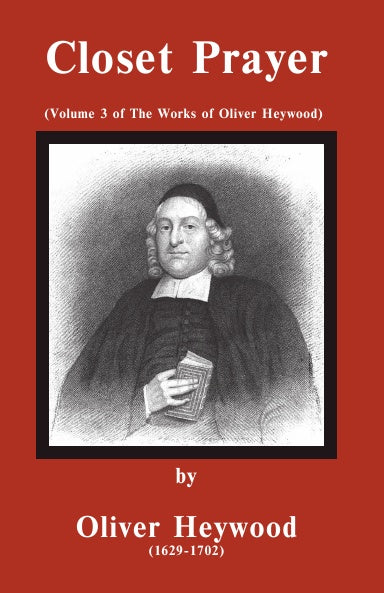Proto Press Books
Closet Prayer - Volume 3 of the Works of Oliver Heywood
Closet Prayer - Volume 3 of the Works of Oliver Heywood
Couldn't load pickup availability
Many Christians find private prayer a difficult duty, and thus they either totally neglect it, or are negligent in their performance of it. In “Private Prayer: A Christian Duty”, Puritan pastor Oliver Heywood illustrates the necessity of spending time in private prayer each day. Using Matthew 6:6 as his text (“But when you pray, go into your room and shut the door, and pray to your Father who is in secret. And your Father who sees in secret will reward you.”), Heywood teaches how to cultivate a habit of daily prayer which is both refreshing and delightful. He reviews the time, place, and content appropriate for our private prayers, and answers several objections that are commonly used to excuse ourselves from praying regularly—including lack of time, cold-heartedness, wandering thoughts, and not knowing what to say. Several Scriptural instances of private prayer are explored, including the Lord’s Prayer and the mighty wrestling of Jacob in prayer (Genesis 32). Through this teaching, the believer will find resources and encouragement to help fulfill this beneficial obligation.
“Thy business is not with men, but with God; seek, therefore, to please and enjoy him. Nor yet art thou to fetch a compass and pray to saints and angels, but go straight to God in the name of Christ, and be sure thou look upon him as under the delightful relation of a tender Father, yea, “ thy Father.” Oh, a sweet word, a blessed word, and such a word as we durst not have taken into our mouths had it not been for Christ’s glorious undertaking to procure adoption for us, and his gracious encouragement in the prescribed form of prayer, and also for God the Father’s voluntary condescension. Come then, and fear not, poor disciple of Christ, come with filial affections, and the spirit of adoption, and thou art sure to speed, for this paternal relation imports affection, provision, condescension and compassion. If thou wilt be a child to him, he will be a Father to thee.”
About the Author
Oliver Heywood (1629-1702) was born in March 1629, the son of Richard and Alice Heywood, in Little Lever, in the parish of Bolton. He was named for his grandfather, and was the fourth of nine children. He entered Trinity College, Cambridge, on July 9, 1647, from where he received his bachelor's degree. He began his ministry at Coley chapel in the parish of Halifax in 1650, and was ordained as a Presbyterian there in 1652. Oliver Heywood married Elizabeth Angier on April 25, 1655. From this union came three sons: John, Eliezer, and Nathaniel, who lived bu a short time. His wife, who was never very well, died on May 26, 1661. He remained a widower for over six years, before marrying Abigail Compton on June 27, 1667. Heywood was ejected in 1662 by the Act of Uniformity from his church in Halifax, but continued to preach for which he was excommunicated from the Church of England. He died May 4, 1702. His collected works fill five volumes.
Shipping & Returns
Shipping & Returns
We offer a 14-day return policy on all book orders unless otherwise noted in the product description
Dimensions
Dimensions


